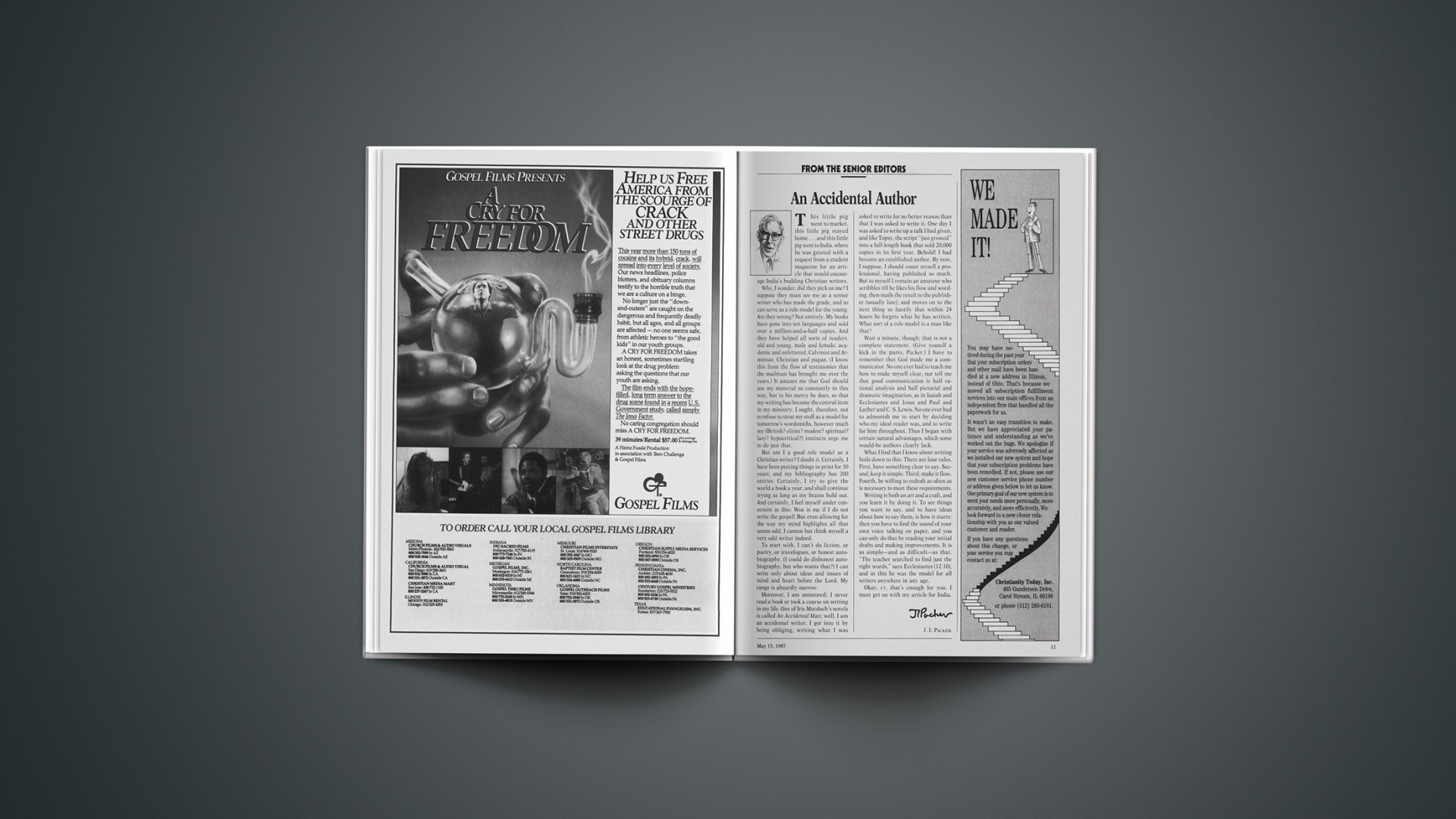This little pig went to market, this little pig stayed home … and this little pig went to India, where he was greeted with a request from a student magazine for an article that would encourage India’s budding Christian writers.
Why, I wonder, did they pick on me? I suppose they must see me as a senior writer who has made the grade, and so can serve as a role model for the young. Are they wrong? Not entirely. My books have gone into ten languages and sold over a million-and-a-half copies. And they have helped all sorts of readers, old and young, male and female, academic and unlettered, Calvinist and Arminian, Christian and pagan. (I know this from the flow of testimonies that the mailman has brought me over the years.) It amazes me that God should use my material so constantly in this way, but in his mercy he does, so that my writing has become the central item in my ministry. I ought, therefore, not to refuse to strut my stuff as a model for tomorrow’s wordsmiths, however much my (British? elitist? modest? spiritual? lazy? hypocritical?) instincts urge me to do just that.
But am I a good role model as a Christian writer? I doubt it. Certainly, I have been putting things in print for 30 years, and my bibliography has 200 entries. Certainly, I try to give the world a book a year, and shall continue trying as long as my brains hold out. And certainly, I feel myself under constraint in this: Woe is me if I do not write the gospel! But even allowing for the way my mind highlights all that seems odd, I cannot but think myself a very odd writer indeed.
To start with, I can’t do fiction, or poetry, or travelogues, or honest autobiography. (I could do dishonest autobiography, but who wants that?) I can write only about ideas and issues of mind and heart before the Lord. My range is absurdly narrow.
Moreover, I am untutored; I never read a book or took a course on writing in my life. One of Iris Murdoch’s novels is called An Accidental Man; well, I am an accidental writer. I got into it by being obliging, writing what I was asked to write for no better reason than that I was asked to write it. One day I was asked to write up a talk I had given, and like Topsy, the script “just growed” into a full-length book that sold 20,000 copies in its first year. Behold! I had become an established author. By now, I suppose, I should count myself a professional, having published so much. But to myself I remain an amateur who scribbles till he likes his flow and wording, then mails the result to the publisher (usually late), and moves on to the next thing so hastily that within 24 hours he forgets what he has written. What sort of a role model is a man like that?
Wait a minute, though; that is not a complete statement. (Give youself a kick in the pants, Packer.) I have to remember that God made me a communicator. No one ever had to teach me how to make myself clear, nor tell me that good communication is half rational analysis and half pictorial and dramatic imagination, as in Isaiah and Ecclesiastes and Jesus and Paul and Luther and C. S. Lewis. No one ever had to admonish me to start by deciding who my ideal reader was, and to write for him throughout. Thus I began with certain natural advantages, which some would-be authors clearly lack.
What I find that I know about writing boils down to this: There are four rules. First, have something clear to say. Second, keep it simple. Third, make it flow. Fourth, be willing to redraft as often as is necessary to meet these requirements.
Writing is both an art and a craft, and you learn it by doing it. To see things you want to say, and to have ideas about how to say them, is how it starts: then you have to find the sound of your own voice talking on paper, and you can only do that by reading your initial drafts and making improvements. It is as simple—and as difficult—as that. “The teacher searched to find just the right words,” says Ecclesiastes (12:10), and in this he was the model for all writers anywhere in any age.
Okay, CT, that’s enough for you. I must get on with my article for India.
J. I. PACKER










